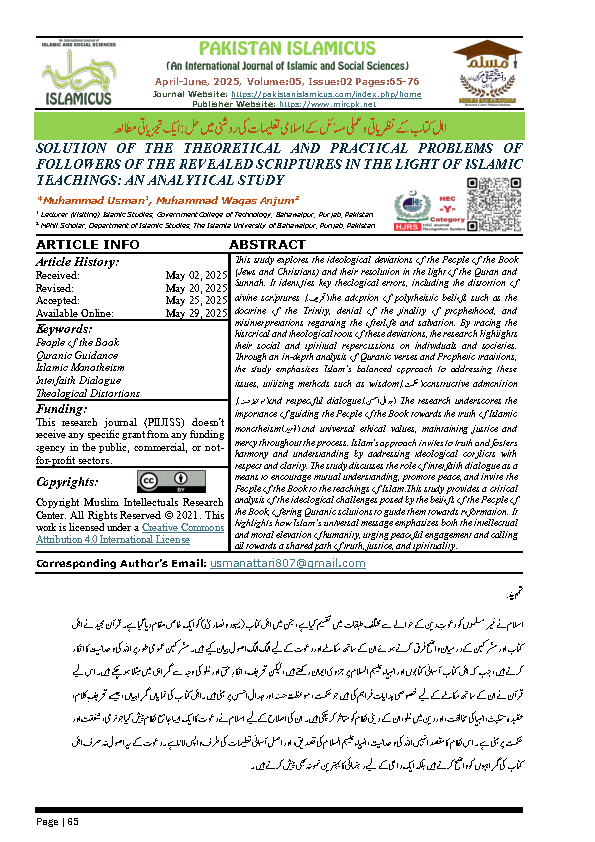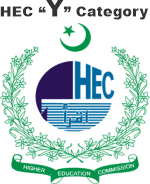اہل کتاب کے نظریاتی و عملی مسائل کے اسلامی تعلیمات کی روشنی میں حل:ایک تجزیاتی مطالعہ
SOLUTION OF THE THEORETICAL AND PRACTICAL PROBLEMS OF FOLLOWERS OF THE REVEALED SCRIPTURES IN THE LIGHT OF ISLAMIC TEACHINGS: AN ANALYTICAL STUDY
Keywords:
People of the Book; Quranic Guidance; Islamic Monotheism; Interfaith Dialogue; Theological Distortions.Abstract
This study explores the ideological deviations of the People of the Book (Jews and Christians) and their resolution in the light of the Quran and Sunnah. It identifies key theological errors, including the distortion of divine scriptures (تحریف), the adoption of polytheistic beliefs such as the doctrine of the Trinity, denial of the finality of prophethood, and misinterpretations regarding the afterlife and salvation. By tracing the historical and theological roots of these deviations, the research highlights their social and spiritual repercussions on individuals and societies. Through an in-depth analysis of Quranic verses and Prophetic traditions, the study emphasizes Islam’s balanced approach to addressing these issues, utilizing methods such as wisdom (حکمت), constructive admonition (موعظہ حسنہ), and respectful dialogue (جدال احسن). The research underscores the importance of guiding the People of the Book towards the truth of Islamic monotheism (توحید) and universal ethical values, maintaining justice and mercy throughout the process. Islam’s approach invites to truth and fosters harmony and understanding by addressing ideological conflicts with respect and clarity. The study discusses the role of interfaith dialogue as a means to encourage mutual understanding, promote peace, and invite the People of the Book to the teachings of Islam.This study provides a critical analysis of the ideological challenges posed by the beliefs of the People of the Book, offering Quranic solutions to guide them towards reformation. It highlights how Islam’s universal message emphasizes both the intellectual and moral elevation of humanity, urging peaceful engagement and calling all towards a shared path of truth, justice, and spirituality.
Downloads
References
Qur’an. (2025). Al-‘Imran 187
Fazl al-Rahman. (1996). Ahsan al-Bayan fi Tafsir al-Qur’an (p. 33). Karachi: Zawar Academy Publications.
Qur’an. (2025). Al-Baqarah 124.
Qur’an. (2025). Al-Baqarah 133.
Qur’an. (2025). Al-Baqarah 83.
Islahi, A. A. (1976). Tadabbur Qur’an (p. 183). Lahore: Markazi Anjuman Khuddam al-Qur’an.
Qur’an. (2025). Maryam 17.
Rana, I. (1981). Yahudiyyat wa Masihiyyat (p. 218). Lahore: Muslim Academy.
Daily Jang. (2024, October 4). “Duniya mein Yahudiyon ki tadaad kitni ho gayi?”. Roznama Jang. https://jang.com.pk/news/1397404
A. F. P. (2022, November 29). “Bartaniya mein nifs se bhi kam abadi ‘Isai’ hai”. Independent Urdu.
Qur’an. (2025). Al-Nisa’ 46.
Qur’an. (2025). Al-Baqarah 79.
‘Uthmani, M. S. (2010). Tafsir ‘Uthmani (Vol. 1, p. 256). Karachi: Dar al-Isha‘at.
Qur’an. (2025). Al-Ma’idah 73.
Qur’an. (2025). Al-Tawbah 30.
Qur’an. (2025). Al-Nisa’ 171.
Ahmad Raza Khan. (2012). Kanz al-Iman ma‘Khazain al-‘Irfan (Vol. 1, p. 385). Lahore: Raza Foundation.
Qur’an. (2025). Al-Ma’idah 116.
Qur’an. (2025). Al-Nisa’ 155.
Qur’an. (2025). Al-Nisa’ 171.
Qur’an. (2025). Al-Ma’idah 13.
Qur’an. (2025). Al-Nisa’ 161.
Qur’an. (2025). Al-Nahl 125.
Sajjad, F. (Afadat Dr. Tahir al-Qadri). (2020a). Da‘wat wa tabligh-e din mein khawateen ka kirdar (p. 41). India: Minhaj al-Qur’an Publications.
Sajjad, F. (Afadat Dr. Tahir al-Qadri). (2020a). Da‘wat wa tabligh-e din mein khawateen ka kirdar (p. 42). India: Minhaj al-Qur’an Publications.
Azhari, K. S. (1994). Zia’ al-Qur’an (Vol. 2, p. 150). Lahore: Zia’ al-Qur’an Publications.
Qur’an. (2025). Al-An‘am 105.
Qur’an. (2025). Al-Baqarah 256.
Daylami. (1986). Musnad al-Firdaws (Vol. 5, p. 345). Beirut: Dar al-Kutub al-‘Ilmiyyah.
Bukhari, M. b. I. (1997a). Al-Jami‘ al-Sahih (Vol. 2, p. 553, Hadith 1447). Beirut: Dar al-Ma‘arif.
Bukhari, M. b. I. (1997b). Al-Jami‘ al-Sahih (Vol. 5, p. 2227, Hadith 5625). Beirut: Dar al-Ma‘arif.
Bukhari, M. b. I. (1997c). Al-Jami‘ al-Sahih (Vol. 3, p. 1012, Hadith 2786). Beirut: Dar al-Ma‘arif.
Bukhari, M. b. I. (1997d). Al-Jami‘ al-Sahih (Vol. 1, p. 450, Hadith 220). Beirut: Dar al-Ma‘arif.
Hamidullah, M. (1994). ‘Ahd Nabawi mein nizam-i hukmarani (pp. 86–88). Karachi: Majlis Nashriyat-e Islam.
Maududi, A. A. (1982). Tafhim al-Qur’an (Vol. 2, p. 105). Lahore: Islamic Publications.
Bukhari, M. b. I. (1997e). Al-Jami‘ al-Sahih (Vol. 1, p. 450, Hadith 1395). Beirut: Dar al-Ma‘arif.0
Abu Dawud, S. b. al-A. al-Sijistani. (1969). Sunan Abi Dawud (Vol. 3, p. 170, Hadith 3052). Damascus: Maktabat al-Maktab al-Islami.
Qur’an. (2025). Al-Ma’idah 5.
Mirpuri, M. A. (1997). Fatawa Sirat Mustaqim (p. 398). Lahore: Maktabah Dar al-Salam.
Qur’an. (2025). Al-Ma’idah 5.
Bukhari, M. b. I. (1997f). Al-Jami‘ al-Sahih (Vol. 5, p. 2097). Beirut: Dar al-Ma‘arif.
Ibn Qayyim al-Jawziyyah. (1990). Ahkam Ahl al-Dhimmah (Vol. 1, pp. 503–505). Beirut: Dar al-Ma‘arif.
Islamic Fiqh Academy Jeddah. (2018). A study on machine slaughter (pp. 45–50).
Qur’an. (2025). Al-Mumtahanah 8.
Bukhari, M. b. I. (1997g). Al-Jami‘ al-Sahih (Vol. 3, p. 143). Beirut: Dar al-Ma‘arif.
Tahir al-Qadri, M. (2020). Musalmanon aur ghair Musalmanon ke bahami ta‘alluqaat (p. 270). Lahore: Minhaj al-Qur’an Publications.
Hickings, J. (2018). Interfaith harmony and global peacebuilding (p. 35). New York: Harmony Publications.
World Council of Religions. (2020). Interfaith collaboration for global peace (p. 38). Geneva: WCR Publications.
Becket, J. (1995). Muhammad Rasul Allah (H. Hyderabadi, Trans., p. 538). Karachi: Citizen Publishers.
Imam al-Din, A. M. (1995). Ghair Muslim mashahir ‘alam aur mahasin-i Islam (p. 9). Karachi: Siddiqi Trust.
Siddiqi, M. A. (2002). Qurun-i Ula mein Musalmanon ke ghair Muslimon se ta‘alluqaat wa mu‘ahidaat aur ‘asr-i hazir (PhD thesis, Punjab University, pp. 193–194). Lahore: University of the Punjab.
Nadwi, M. U. (2004). Ahl-i Kitab Sahabah wa Tabi‘in (pp. 120–280). Lahore: Al-Faisal Nashiran wa Tajiran.

Downloads
Published
Issue
Section
License
Copyright (c) 2025 PAKISTAN ISLAMICUS (An International Journal of Islamic & Social Sciences)

This work is licensed under a Creative Commons Attribution 4.0 International License.
This work is licensed under a Creative Commons Attribution 4.0 International License.
































